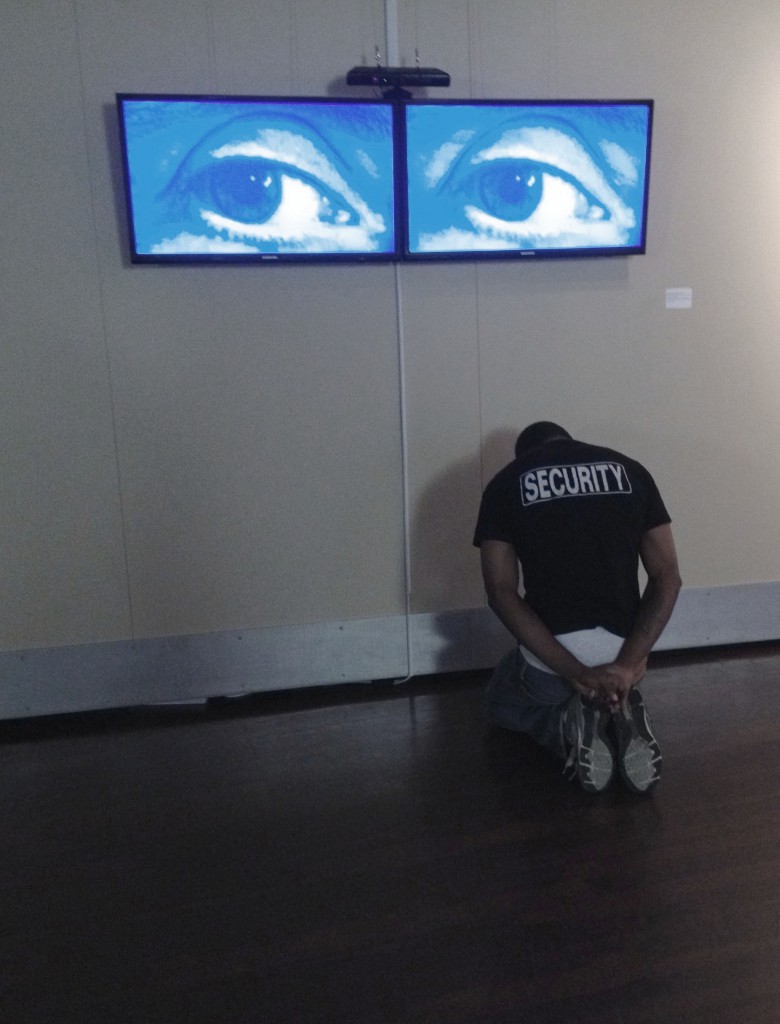Algorithmic Pollution: Artists Working with Dataveillance and Societies of Control
Main Article Content
Abstract
In 2013, interactive artist and Prix Ars Electronica Golden Nica winner, David Rokeby, coined the phrase Algorithmic Pollution to describe a phenomena where data collection alters human public behavior. The purpose of this article is to contextualize the topic of Algorithmic Pollution and artists working with data, surveillance and landscape. The inspiration came from the exhibition I curated in 2013, CYBER IN SECURITIES for the Washington Projects for the Arts in DC, at the Pepco Edison Gallery. The curation was completed just two weeks prior to Edward Snowden’s controversial leaking of security documents to The Guardian newspaper. CYBER IN SECURITIES reflects artists that have responded to massive data collection and the residual scrutiny of their private lives by creating artworks distributed through networks and systems that operate under their own control and rules. They’re also reacting to the transmission of that data in urban and natural spaces and its interactive processing with the human psyche and body. Artists have described this phenomenon as “environmentalized”, “a psychic takeover” and again, “algorithmic pollution”, altering our perceptions of our relationship with the environment both natural and urban.
Article Details

This work is licensed under a Creative Commons Attribution-ShareAlike 4.0 International License.
References
Bauman, Zygmunt. Globalization: The Human Consequences. New York: Columbia University Press, 1998.
Bergson, 162.
Bergson, 165.
Bergson, Henri, and Arthur Mitchell. Creative Evolution. New York: Random House, 1944. pp 168.
Bogard, William. “Discipline and Deterrence: Rethinking Foucault on the Question of Power in Contemporary Society.” The Social Science Journal 28.3 (1991): 327. www.isi-dl.com/downloadfile/123318.
Brown, Sheldon. “Video Wind Chimes by Sheldon Brown.” Video Wind Chimes. 1992. http://www.sheldon-brown.net/vwc/index2.html.
“Daily Report: Apps That Anticipate Your Needs.” July 30, 2013. http://bits.blogs.nytimes.com/2013/07/30/daily-report-apps-that-anticipate-your-needs/?_r=0.
David Rokeby. “Algorithmic Pollution.” Lecture, CYBER INSECURITIES PANEL, Pepco Edison Place Gallery, Washington DC, September 2013.
Deleuze, 4.
Deleuze, Gilles. “Postscript on the Societies of Control.” October Vol 59.Winter (1992): 3-7.
Dewey-Hagborg, Heather. “Stranger Visions.” Lecture, CYBER INSECURITIES PANEL, Pepco Edison Place Gallery, Washington DC, September 2013.
Discipline and punish: the birth of the prison. By Michel Foucault. London: Penguin , 1977. 195-215. Print.
Dyson, George. Turing’s Cathedral: The Origins of the Digital Universe. New York: Pantheon Books, 2012. PP 9.
Frontline Spying on the Home Front “The NSA’s Eavesdropping at AT&T, May 15, 2007. http://wwwpbs.org/wgbh/pages/frontline/homefront/view/
Herhold, Scott. “Herhold: Brock Turner Deserves County Jail, Not State Prison, for Stanford Sex Assault.” East Bay Times. 2016. http://www.eastbaytimes.com/2016/06/01/herhold-brock-turner-deserves-county-jail-not-state-prison-for-stanford-sex-assault/.
Hickman, Leo. “How Algorithms Rule the World.” The Guardian. July 01, 2013. https://www.theguardian.com/science/2013/jul/01/how-algorithms-rule-world-nsa.
Holder, Eric, Attorney General. Proceedings of Delivers Remarks at the Congressional Black Caucus Foundation Criminal Justice Issues Forum. September 19, 2013
Ibid.
Ibid, pp. 4.
Ibid, 165.
“Lexie Mountain’s Portfolio | Baker Artist Portfolios.” Lexie Mountain’s Portfolio | Baker Artist Portfolios. http://bakerartist.org/nominations/view/alexandramacchi/105393/. 2014
Lyon, 94-118.
Lyon, David. Surveillance Studies: An Overview. Cambridge: Polity Press, 2008. Pp 94-118.
“Mail Cover.” Wikipedia. https://en.wikipedia.org/wiki/Mail_cover.
Magid, Jill. “Evidence Locker.” Jill Magid. Accessed September 04, 2015. http://jillmagid.paas.webslice.eu/projects/evidence-locker-2.
McLuhan, 90.
McLuhan, Marshall. Understanding Media the Extension of Man. London: Routledge & Kegan, 1964. pp 79.
Mobertz, Lauren. “This Marketing Firm Just Released Your Personal Data – but Is It Enough?” The Dash Burst. June 06, 2013. https://blog.dashburst.com/acxiom-releases-personal-data-information/.
Morran, Chris, Consumerist. “Google Update Begins Transition From Search Engine To ‘Knowledge Engine'” Consumerist. 2012. https://consumerist.com/2012/05/16/google-update-begins-transition-from-search-engine-to-knowledge-engine/.
PRI. “Studio 360: Kurt Andersen’s DNA Mask Revealed.” PRI Public Radio International. February 07, 2013. http://www.youtube.com/watch?v=u1jgkykLBVI. 1:18min
Reel, Monte. “Secret Cameras Record Baltimore’s Every Move From Above.” Bloomberg Businessweek. August 23, 2016. https://www.bloomberg.com/features/2016-baltimore-secret-surveillance/.
Risen, James, and Eric Lichtblau. “How the U.S. Uses Technology to Mine More Data More Quickly.” The New York Times. June 08, 2013. http://www.nytimes.com/2013/06/09/us/revelations-give-look-at-spy-agencys-wider-reach.html.
Rokeby, David. Algorithmic Pollution: Artists Working with Data, Surveillance and Landscape. Proceedings of College Art Association, Washington DC. February 6, 2016. Moderated by Ingrid Bachmann and Lisa Moren, with panelists, Dr. Tiffany Holmes, Dana Dal Bo, Davide Rokeby and Jason Hoelscher.
Rokeby, David. “Transforming Mirrors: Subjectivity and Control in Interactive Media.” In Critical Issues in Interactive Media, edited by Simon Penney, 133-58. Albany, NY: SUNY Press, 1995.
Rokeby, Washington D.C.
Simon, 8.
Simon, 15.
Simon, Bart. “The Return of Panopticism: Supervision, Subjection and the New Surveillance.” Surveillance & Society 3.1 (2005): 3. http://ojs.library.queensu.ca/index.php/surveillance-and-society/issue/view/Open%202005.
Welch, Robert. George Orwell Nineteen eighty-four. London: Longman, 1986. Print. PP3.
@TiareDunlap. “Ryan Lochte Is a ‘Really Good Guy’ Who Made an ‘Amazingly Stupid Decision,’ Says Olympic Medalist Rowdy Gaines.” PEOPLE.com. 2016. http://www.people.com/people/package/article/0,,20996464_21025620,00.html



